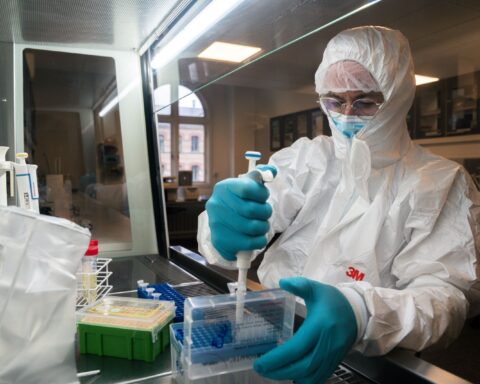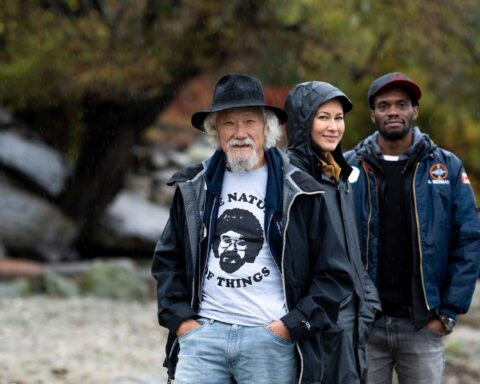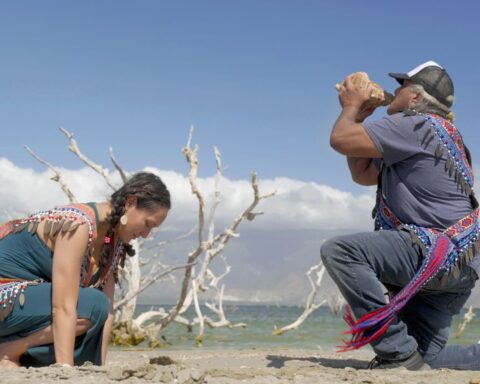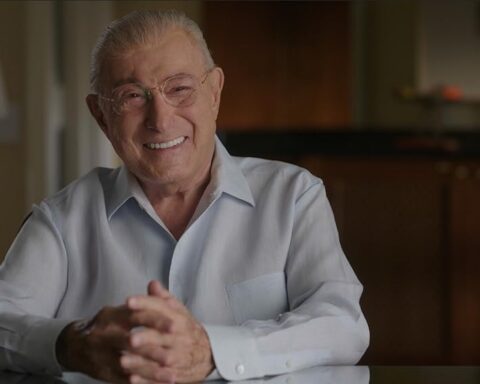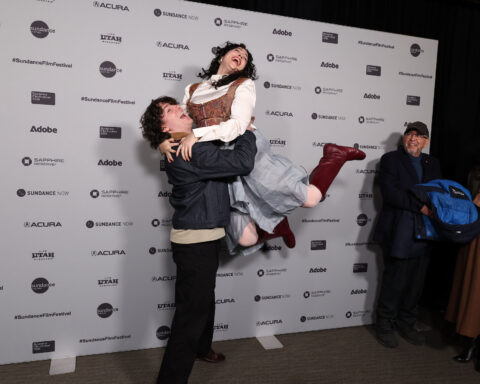Laura Sky is living a hippie dream. Her utopian vision for the non-profit SkyWorks Foundation has led to three decades of what she calls “wildly participatory” documentary filmmaking about society’s forgotten people.
“People who thought they had flunked life,” says Sky.
SkyWorks is not about red carpets. It doesn’t do festivals. It doesn’t apply to the Canada Media Fund or Telefilm Canada for funding. Forget MIPCOM or pre-sales. And who needs broadcasters anyway? Is this woman for real?
Sky is so green, in film-business lingo, that she didn’t know the common international sales term “evergreen.” Yet she tackles timeless topics with universal themes, however thorny.
Homeless people (Home Safe), grief-stricken youth (Kids Care) and people with addictions (Recovering Love) are top of mind. Sky simply says that SkyWorks’ “educational content” has a “long shelf life” because most of it “could have been filmed yesterday.”
Ironically, the docs might have been filmed yesterday but they are about change today. “Change the world one documentary at a time” is more than a company slogan for the foundation and its founder. It’s a way of life and interactive, collaborative filmmaking that was conceived in the late ’60s and flourished in the ’70s still grows, somewhat organically, in downtown Toronto today.
Sky is a soft-spoken activist in a long flowing skirt with a sweet smile and a disarming manner, yet she aptly describes herself as “fierce.” She counts the likes of Chile’s formidable documentary filmmaker Patricio Guzmán, the director of the legendary Battle of Chile trilogy (1975–1979), amongst her colleagues and unintentional mentors. “In Havana [at the famous revolutionary film festival], when Patricio Guzmán took me gently by my shoulders, he said to me, ‘You have the right to be an artist.’ I had already decided that I had the right to be an activist.”
In the ’70s, she explains, “We saw film and video as a tool box for social change.” A fascinating life and film journey led Sky to establish today’s SkyWorks Foundation in 1983 as a non-profit documentary organization. Its purist ideals have survived in a highly competitive, often vicious industry, famous for very short lifespans.
So what’s her secret?
“Please don’t make this sound like it’s easy,” Sky implores as we wrap up with a great cup of homemade coffee in her office space, part of an artists’ haven in a creative building complex that, once again, makes it hard to believe we’re in 21st-century Toronto. “The challenges are formidable,” she says, especially now. “This is a terrible time for critical vision and voice in Canada. This is a most vulnerable time for the charitable and non-profit sector. It is an urgent time to sustain our independence and relationships for social change. We can’t allow ourselves to be still, to stop—to be quiet. We cannot shut off or shut up.”
The wildly participatory process
Sky and a dedicated three-person team at SkyWorks make “co-operative” docs that reach actual victims, their families, friends and communities. The subjects of the films are called “participants” and some become their documentary’s special advisors because they are the experts on the topic at hand, including breast-cancer survivors.
“In our work from day one on our projects, with the communities we work with, this process of participation has vitality, curiosity, the risks of engagement and hopefulness,” Sky explains. “Participation is the essence of our documentaries, and commitment to work with people—to stand with them.”
The participants also effectively have approval over the final cut. “They don’t just sign a waiver,” Sky says proudly. “It is an open-ended consent process.”
Participants actually see the film three times before it’s locked, and they have the written right to expect changes. “If they think we didn’t get it right,” says Sky, “we’ll change it.”
The participants who wish to get really involved become facilitators, get trained and take the films out (in groups with two adults and two youth) to audiences. They engage in discussions with people who have often shared similar fates and are looking for change.
“When we show our films in communities, audiences mostly want to discuss the issues, their experiences, the strategies that have worked, don’t work, might work,” Sky explains of the hands-on screening method and the discussions afterwards. “Usually our audiences are people with similar experiences.”
It may sound too therapeutic for cinema, but the participants gush. “My experience with Laura has forever changed me and has inspired the way that I intentionally live a life of service to others in an effort to help restore dignity,” says Colleen Richards. “I first met Laura as a participant for Home Safe Toronto. Laura helped us tell our stories in a way that we were able to begin regaining our dignity. From the moment we met, I was treated as an equal and as we shared our struggles, she asked us our opinions on the larger picture and it was the first time in a very long while that I had even really thought about the bigger picture.
“I had been so busy trying to save my family from the frightening possibility of living on the street that the guilt and shame began to consume me,” Richards goes on. “Maybe I was too afraid to look at the bigger picture. Laura’s gentleness and reassuring spirit offered me the sense of safety that I needed to look and I began to see that my family was now a product of [a] systemic problem. The guilt and shame began to heal and I began to own my story. I am now proud to talk about what my family went through because Laura and the whole team at SkyWorks has shown me, and has offered me, many opportunities to allow what we went through to make a difference in that larger picture.”
That will be music to Sky, who hopes that the films empower their subjects. “In the films we wanted to say ‘You’re part of something bigger’ without being patronizing,” explains Sky. The process, even before it’s seen by the public, can take a few years. There is extensive research, an advisory group and production.
Sky points to Kids Care, which had 17 kids in the advisory group, as an example of the care that’s taken to ensure everyone’s comfort during the research period. “We worked with them for a year and a half before we filmed,” explains Sky.
Ongoing challenge for change
SkyWorks’ wildly participatory model was originally developed during Sky’s days in the National Film Board of Canada’s vanguard filmmaking program called Challenge for Change. “All my learning was done at the Film Board,” she says. “We were competing for dollars but standing together for change.”
Sky first balked at the NFB job in 1972 because it ran contradictory to her activist’s sense of financial independence or, as she bluntly puts it, “I didn’t want to be employed by the state.” But eventually, she caved.
“I was a single mom and I was tired of being poor so I said ‘Yes,’” she laughs, recalling that the real attraction lay in that original challenge for change. “I was responsible for southern Ontario,” she says nostalgically, if just for a moment. “Communities were invited to give their input into the film,” she says, “and that is the model for now.” It’s the 21st century and she still makes it fly.
So who’s the bank fairy?
Not surprisingly, distribution doesn’t dictate SkyWorks’ activities either, and ratings are not the most important factor. “Our films are not designed for people to be watching on television alone in the dark,” says Sky, adding she is happy if 1,000 people see the film in 50 to 60 hands-on screenings.
So there’s virtually no government funding and no typical corporate sponsorships. Maybe there’s a broadcaster?
“Last night was a sleepless night, for instance, but we can’t let broadcasters be the gatekeepers,” says Sky, before explaining her theory about the airwaves. “When a broadcaster says ‘No,’ you’re cut off from your audience. When a funder says ‘No,’ you move sideways,” she elaborates.
And with repeat funders: “It’s not an adversarial relationship like it is with a broadcaster,” says Sky. “It’s collaborative rather than adversarial.” That kind of freedom is at the core of the foundation’s charitable status origins and every move this company makes.
“We wanted to be very accountable for the money people contributed to our films,” explains Sky of her 1983 decision to go the non-profit route. “It is crucial to be transparent financially.”
Some people apparently thought that SkyWorks’ charitable status was just a business plan for fundraisers. “It’s not,” says Sky. “This is not just that we haven’t got a broadcaster so we become a charitable foundation. Your integrity has to be very clear to you.”
As such, SkyWorks funders “are very arm’s length. We invite them to test screenings, but a funder has never asked for a change,” she is quick to note, carefully avoiding the word “censorship.”
SkyWorks Foundation also takes on “commissioning clients” about every two years. “That’s where we don’t have to struggle to find the budget,” says Sky. “We’re known for making films about mental health so we get commissioned to do them.”
After SkyWorks’ only venture with a broadcaster (TVO) didn’t pan out many moons ago, Sky decided that the compromise of control for coin just didn’t cut it. Her long-term financiers are private investors and foundations who bought in because they were interested in the community-development component, not ratings or box office.
“In talking about our funding models and our sustained, long-term relationships with foundations and donors, I realize how important it is to those funders not simply that we make documentary films but that woven into the research—the making of them and the using of them—is the community development component,” says Sky.
SkyWorks’ long-term relationships include The Law Foundation, which contributed significant funding to Crisis Call (2002/3) as well as the Home Safe project (2007). The Catherine Donnelly Foundation provided funding to all of the Home Safe films.
The Lawson Foundation has funded nationwide SkyWorks’ activities to support and promote the docs on Kids Care (2004–2007) as well as the ongoing Real Change programme (2011–2013). The Jackman Foundation support has spanned five years and six grants. “And Recovering Love, our project working with mothers who have experienced addiction issues, was funded almost entirely by the people of Sudbury,” she says.
It’s an impressive list.
“They have been consistently and generously supportive,” says Sky of her financial backers, adding the same is true of many individuals who make repeat donations because they share her vision for change.
“I don’t want to create the impression that foundation and donor funding is simply a really smart business plan to make movies,” says Sky. “Foundations and individual donors are drawn to the work because they like the project participants and want to make a difference in the issues that we take on together.
“When we took on the Home Safe project, I wondered whether donors who supported our work with women and families who were dealing with breast cancer would join us in our work with families and children who have experienced homelessness, and the answer was a clear ‘Yes,’” she explains. “How wonderful is that?”
Learning is the process
Sky cherishes her honorary doctorate from Laurentian University in Sudbury for her documentary work. “Me—who barely finished high school and could not make it through my first and only year of university!” she says candidly. She later “taught a few years at Queen’s [University] then almost got fired at Ryerson because I was fierce.”
Sky was passionate about teaching and says that not teaching is her “one regret” right now. It’s clear, though, that Sky’s interactive filmmaking continues her didactic role, which is why she is still annoyed by her own initial reaction to advice from a young kid, one of her special participants.
One day, “when I heard myself say to myself that ‘no 12-year-old is going to tell me how to make a film,’ I realised how wrong I was,” she says. “It was a real learning moment.” “Teacher,” she might be saying, “teach yourself.”
Sky’s most “unforgettable moment” was related to her first film, a landmark documentary about women coal miners. “My first independent film, Moving Mountains, was produced in the early ’80s. It told the stories of the first women coal miners in Canada in a small single-company town on the B.C.- Alberta border.
“When we finished the film and took it back to the town, the audience filled the hunting hall to the rafters—literally. Finally, the women got the recognition they deserved. The next morning we showed it in the local school and filled the gym, with the kindergarten kids at the front and the high school kids in the back. Each time one of the kids saw their parent in the film—they had never seen their work—there was a flutter and a flurry of excitement in that corner of the room. That film was used and seen for years and years and years,” says Sky.
Many days, Sky is living the dream of rebellious youth. She not only talked about revolution in the ’60s and ’70s, she’s still living it. Her work actually helps other people. One wonders what, if any, are the drawbacks of such a lifelong commitment with no profit?
“I struggled with myself as an artist,” she says candidly. “I made some really boring and ugly films, but they were useful.” Sky says her lifelong balancing act is “managing the tension between beauty and the participatory.
“I love it completely, even when it’s hard,” says Sky.




